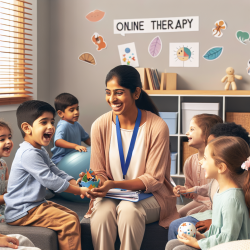Unlocking Potential: Integrating Research Insights into Online Therapy for ADHD and Autism

In the realm of special education and online therapy, staying abreast of the latest research is paramount to providing effective and tailored interventions. One recent study, "The Co-existence of ADHD With Autism in Saudi Children: An Analysis Using Next-Generation DNA Sequencing," offers groundbreaking insights that can enhance the skills of practitioners working with children diagnosed with ADHD and autism.This study, conducted by Bogari et al. (2020), aimed to explore the genetic overlap between ADHD and autism in Saudi children using advanced whole-exome sequencing techniques. The findings highlight the significance of specific genetic variants that could inform better diagnostic and therapeutic strategies.
Key Findings and Their Implications
The study identified several genetic variants that are associated with both ADHD and autism. Notably, six variants (chr1:98165091, chr6:32029183, chr6:32035603, chr6:32064098, chr8:2909992, chr16:84213434) were found in 75% of the patients with both conditions. These findings suggest a genetic underpinning that could explain the co-occurrence of ADHD and autism, which is crucial for developing targeted interventions.
Implementing Research Outcomes in Online Therapy
As an online therapist, incorporating these research insights can significantly improve the quality of care you provide. Here are some actionable steps:
- Personalized Interventions: Use genetic information to tailor therapy plans. Understanding a child's unique genetic makeup can help in customizing behavioral and educational strategies that are more effective.
- Enhanced Screening: Incorporate genetic screening as part of the initial assessment process. Early identification of these genetic variants can lead to timely and appropriate interventions.
- Collaborative Approach: Work closely with geneticists and other healthcare professionals to interpret genetic data and integrate it into your therapy sessions.
- Continued Education: Stay updated with ongoing research in genetics and neurodevelopmental disorders. Continuous learning will equip you with the latest tools and techniques to support your clients better.
Encouraging Further Research
While the findings of this study are promising, they also highlight the need for further research. Practitioners are encouraged to:
- Participate in Studies: Engage in collaborative research projects that explore the genetic aspects of ADHD and autism. Your practical insights can provide valuable data for scientific studies.
- Advocate for Funding: Support initiatives that seek funding for genetic research in neurodevelopmental disorders. Increased funding can lead to more comprehensive studies and better outcomes.
- Educate Stakeholders: Inform parents, educators, and policymakers about the importance of genetic research in understanding and managing ADHD and autism. Advocacy can lead to more support and resources for affected children.
In conclusion, integrating the findings from "The Co-existence of ADHD With Autism in Saudi Children: An Analysis Using Next-Generation DNA Sequencing" into your practice can enhance your ability to provide personalized and effective online therapy. Embrace these insights to unlock the full potential of the children you work with.To read the original research paper, please follow this link:
The Co-existence of ADHD With Autism in Saudi Children: An Analysis Using Next-Generation DNA Sequencing.
Citation: Bogari, N. M., Al-Allaf, F. A., Aljohani, A., Taher, M. M., Qutub, N. A., Alhelfawi, S., Alobaidi, A., Alqudah, D. M., Banni, H., Dairi, G., & Amin, A. A. (2020). The Co-existence of ADHD With Autism in Saudi Children: An Analysis Using Next-Generation DNA Sequencing. Frontiers in Genetics, 11, 548559. https://doi.org/10.3389/fgene.2020.548559










